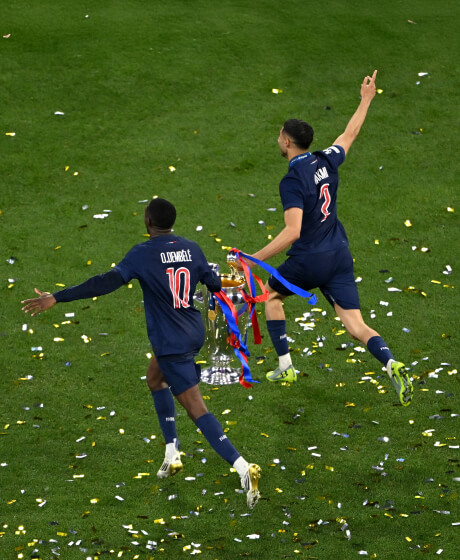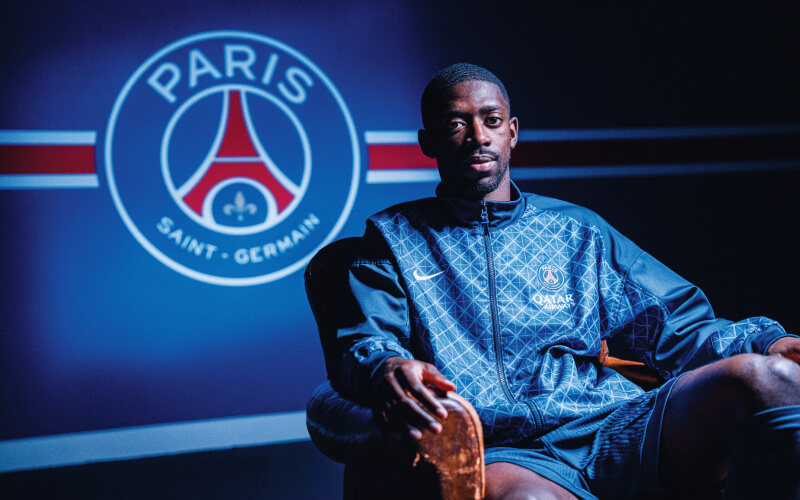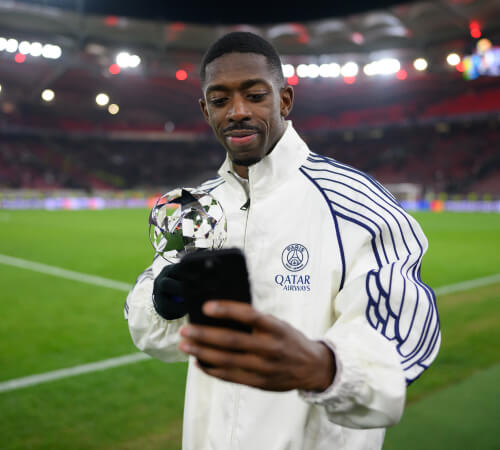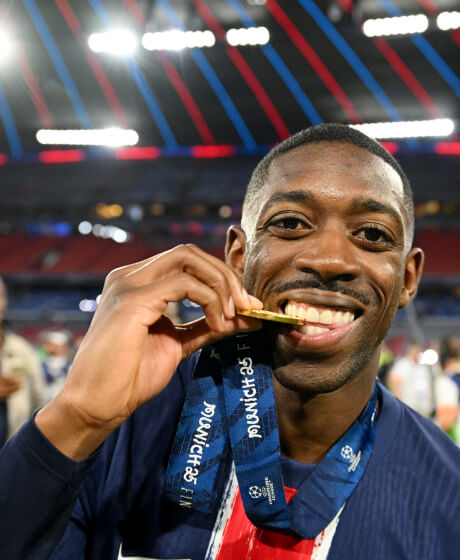He is clinically bright in football terms: analytical, sharp-minded and currently feeling like he rules the world, but he’s harnessing his preternatural abilities to the Luis Enrique-Paris Champions League crusade. For direct evidence of how his brain works, I’m going to let you in on the fascinating skills he demonstrated the last time he and I met.
This was back in August, and the Paris star had just finished his first day of training after the briefest of summer vacations, with the UEFA Super Cup looming. When he arrived at our newly constructed set in one of the ample media rooms at the club’s Poissy training campus, we might have expected one of many things. Impatience to get home to his family, perhaps. Partial attention because his mind was elsewhere. Disinterest because he’s done so many of these interviews in recent months. Well, reader, we got none of the above.
Jaunty, lithe, full of smiles and oozing an absolute genial self-confidence, Paris’ leading Ballon d’Or candidate made the room light up when he entered and, enjoyably, made everyone there feel like he was delighted to have been invited.
But what we had in store for him, beyond asking about his post-nirvana glow since helping Paris clinch their long-sought Champions League crown, was what’s called a ‘Blind Ranking’ test. You’ve seen them, surely. Recipe: take one famous person from the arts or sport and offer them five things to rank – films, actors, goals, players, whatever – revealing them one by one and in no particular order. The guest, not knowing what options await, has to curate them all on a scale of one to five,
with No1 being top of the podium and No5 nowheresville.
If we’re being entirely honest with ourselves, it’s a mischievous concept. One of the key outcomes in the minds of those who conceived this fiendish idea is that there’ll be a hint of embarrassment when options one through four have been chosen and the fifth brings up a player/goal/film/actor that the guest – and everyone who’s watching – knows instantly should be the top pick, except now it can’t be placed anywhere other than fifth because that’s the only slot left. Hilarity and awkwardness ensue, right? Well, not when the man they call ‘Ous’ is playing. No chance.
In this case, we’re going to ask him about five goals from Paris’ triumphant Champions League journey last season: a Bradley Barcola effort against Brest in the knockout phase play-offs, Fabián Ruiz scoring against Arsenal in the semi-finals, Khvicha Kvaratskhelia against Aston Villa in the last eight, Dembélé himself hitting the net against Arsenal and Désiré Doué’s second in the Munich final against Inter.
I’ll try to do him justice when I paint the picture of what happened. Firstly, Dembélé identifies each goal within about the first two seconds. Reactions of a hungry cat, memory of a computer. He then starts off on a precise and engrossing analysis of each goal as it gets played on screen, evidencing the fact that he’s got total photographic recall. Then, neat and tidy with no regrets at the end, he files each clip in numerical order. No confusion in his mind about which goal was better, no confusion about whether he’d placed one of them at No3 or No4 already – crystal clarity and intelligent takes each time. It’s a glimpse of mental acuity that makes you reassess what Dembélé does on the pitch.
It has always looked so silkily easy for this guy. Perhaps too easy. He’s pretty much unique in world football and has been for most of his senior career. There are footballers who share, or even supersede, certain of the Frenchman’s skill package. But nobody has his combination of pace, height, shooting ability, athleticism, ambidextrous dribbling and eye for goal. Suddenly, in Lamine Yamal, there’s new competition. But the world-class talent that Dembélé has most resembled during the best of his seasons is, frankly, Neymar.
The two of them possess a devastating, Ferrari-esque ability to go from 0 to 60 with the ball at their feet. Close your eyes and imagine either one: in possession, faced up by a rival and stationary. With a dip of the shoulder in one direction and quick feet, both can then disappear in a cloud of exhaust fumes and set off running – dribbling mesmerically, in fact – at something close to 35km/h, while the opposition team is split asunder, stunned in shock and awe.
Because of that, it’s always been tempting to think Dembélé simply improvises, sees green space and decides to gallop. Instead, under Paris coach Luis Enrique, his prodigious confidence, goal power (35 last season) and trophy haul (eight in two years) owe more to the fact that he has a tremendously good football brain, plus that peripheral vision and ability to process information for which people have venerated Lionel Messi. Everything, including maturity, has come together for the 28-year-old in what can now be considered the golden era of his tantalising career.
Just for your information, here’s what the Paris ace had to say about the five goals we showed him. Barcola’s effort against Brest is played first, a neat solo strike showcasing pace and improvisation, and Dembélé knows automatically what to do with it. “I think Bradley missed his first touch, but he immediately made it right – it’s a very nice goal. I’m going to rank this fifth.”
Next, he sees Fabián Ruiz’s screamer from the edge of the area against Arsenal and launches into a summary. “I think the ball’s going to be deflected on the way in… Yes! Very nice goal, important too. Fourth place.”

























